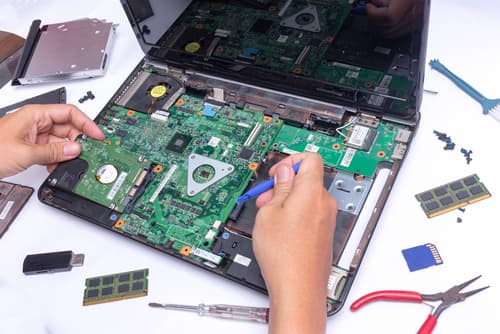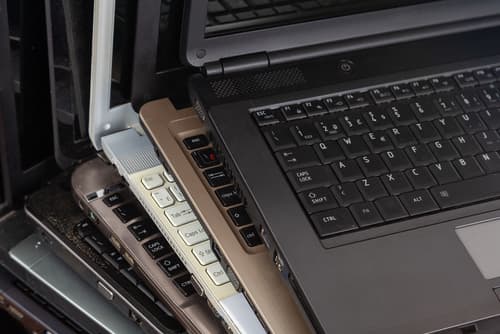In Kenya, mentioning the word “refurbished” often makes people cringe. Many Kenyans worry that a refurbished device might be unreliable, outdated, or simply a waste of money.
But what if that fear is based on misunderstandings? While it’s true that refurbished gadgets have been used before, a properly refurbished laptop can perform just as well as a brand-new one.
As technology advances, refurbished laptops have gained popularity as an affordable and preferred option for Kenyans looking for laptops on a budget.
So, Let’s dig deeper and see if refurbished laptops are worth considering when shopping for a laptop in Kenya.
What are Refurbished Laptops?
A refurbished laptop is a previously owned device that has been returned to the manufacturer or a certified refurbishment facility for inspection, repair, and testing.
Unlike second-hand laptops sold directly by individuals, refurbished laptops undergo thorough quality control processes to ensure they function like new.
Refurbished laptops often come from returns due to minor defects, display models, or corporate lease terminations.
For example, a laptop could be returned because the original buyer found a minor issue, wanted a different model, or had a change of mind.
When the laptop is returned, it goes through a refurbishment process to restore it to top performance before it is sold again, often at a significantly reduced price.
How Refurbishment Works

The refurbishment process is thorough, focusing on quality and performance. Here’s a step-by-step breakdown of how it typically works:
- Inspection: The laptop is inspected for damage or issues, both inside and out. Technicians identify any defective parts and check overall functionality.
- Repairs and Replacement: Any faulty components, such as the hard drive, RAM, or display, are replaced with new or tested parts. Laptops are repaired using original manufacturer components whenever possible.
- Testing: The laptop goes through a series of tests to ensure all hardware components are working as expected. This includes testing the processor, battery, screen, keyboard, ports, and connectivity.
- Cleaning and Repackaging: After testing, the laptop is cleaned to remove any physical signs of previous use. It’s then repackaged, often in a new box, along with standard accessories such as a charger.
- Quality Control: A final inspection ensures that the laptop meets quality standards and is ready for resale. Some refurbished laptops even come with a warranty, providing additional peace of mind.
Common Misconceptions About Used Laptops
Many people in Kenya equate “refurbished” with “inferior” or “unreliable.” However, these misconceptions don’t hold up under closer inspection. Here are some of the most common myths about refurbished laptops:
- Myth 1: Refurbished laptops are always old models.
- Reality: Many refurbished laptops are recent models that have simply been returned or lightly used.
- Myth 2: They don’t last as long as new laptops.
- Reality: Properly refurbished laptops undergo rigorous testing and quality control, ensuring they can last just as long as new laptops.
- Myth 3: Refurbished laptops don’t come with warranties.
- Reality: Many sellers offer limited warranties on refurbished laptops, just like new models.
- Myth 4: Refurbished laptops are less powerful.
- Reality: These laptops often have the same specifications as new models, and any defective parts have been replaced.
Benefits of Buying a Refurbished Laptop
Refurbished laptops offer several distinct advantages that make them an attractive option. Let’s break down the key benefits:
1. Cost-Effectiveness
A refurbished laptop costs significantly less than a brand-new one, making it ideal for students, startups, or professionals working on a budget.
2. Quality Assurance
Refurbished laptops undergo extensive testing and quality control, ensuring they meet manufacturer standards. This makes them reliable, especially when bought from reputable sellers.
3. Warranty and Support
Many reputable sellers, such as Digipoa Gadgets, provide warranties on refurbished laptops. This can range from a few months to a year, offering peace of mind that repairs or replacements are covered if any issues arise.
4. Environmentally Friendly

Choosing a refurbished laptop is an eco-friendly choice, helping reduce electronic waste. By purchasing refurbished electronics, you contribute to a circular economy, reducing the demand for new manufacturing.
5. Modern Specifications
Contrary to popular belief, many refurbished laptops come with modern specifications. From high-speed processors to ample storage, you can often find refurbished laptops that meet today’s computing needs without compromising on performance.
Things to Look For in a Refurbished Laptop
When purchasing a refurbished laptop, keep the following in mind:
- Condition Rating: Reputable sellers categorize refurbished laptops based on condition. Look for a grading system like “A” (near new), “B” (minor wear), or “C” (visible wear) to know what you’re getting.
- Warranty Coverage: Check the warranty terms to ensure you’re covered for any potential issues.
- Battery Life: Refurbished laptops may have shorter battery life, so look for models with a good battery or consider replacing the battery if needed.
- Return Policy: Make sure the seller has a reasonable return policy, allowing you to return the laptop if you’re not satisfied.
How to Choose the Right Refurbished Laptop in Kenya

Finding the right refurbished laptop can be easy if you know what to look for. Here’s a quick guide:
- Identify Your Needs: Are you buying for basic tasks like browsing and emailing, or do you need a high-performance laptop for video editing or gaming? Make a list of your requirements to narrow down your options.
- Set a Budget: Determine how much you’re willing to spend on a refurbished laptop. Keep in mind that high-end specifications may still carry a higher price tag, even if refurbished.
- Research the Model: Once you identify a laptop model you’re interested in, research its specifications, reviews, and performance.
- Find a Reliable Seller: Choose a reputable vendor, such as Digipoa Gadgets, that offers warranties and has positive customer feedback. Reputable sellers are more likely to offer quality laptops and good after-sale support.
- Check for Essential Features: Make sure the laptop has the necessary specifications, such as enough RAM, storage, and a suitable processor for your needs. For professionals, a laptop with at least 8GB of RAM and a solid-state drive (SSD) is ideal.
What Should You Expect from a Refurbished Laptop?
With a refurbished laptop, you can expect good performance, often similar to new models, especially if it’s been refurbished by the manufacturer or a reputable vendor. You’ll likely find some minor cosmetic wear, but functionality should not be compromised.
A refurbished laptop should offer:
- Smooth performance for regular tasks
- Up-to-date operating systems and software
- Moderate to good battery life
- Customer support and warranty coverage
Risks Involved in Buying Refurbished Laptops
Despite the benefits, there are potential risks in buying a refurbished laptop, such as:
- Reduced Battery Life: Since the laptop has been previously used, the battery might not hold as much charge as a new laptop.
- Limited Warranty: Refurbished laptops typically come with shorter warranty periods than new laptops, although reputable sellers often provide sufficient coverage for repairs.
- Cosmetic Wear and Tear: Although the functionality is intact, refurbished laptops may show minor cosmetic damage, such as small scratches or dents.
- Possible Hidden Defects: If the refurbishment was not done by a trusted vendor, there might be hidden issues that arise after purchase.
How to Mitigate Risks When Purchasing Refurbished Laptops
You can reduce the risks associated with buying refurbished laptops by following these tips:
- Buy from Trusted Sellers: Choose a reliable seller with a good reputation, such as Digipoa Gadgets, which is known for quality refurbished electronics and excellent customer service.
- Check Warranty and Return Policy: Ensure the laptop comes with a warranty and a flexible return policy so you’re covered in case of any problems.
- Ask for Documentation: A trustworthy seller will provide documentation of the refurbishment process and a grading of the laptop’s condition.
- Thoroughly Inspect the Laptop: If buying in person, check the laptop for any physical or operational issues. For online purchases, inspect the laptop upon arrival and test its functionality immediately.
Find Reliable Sellers in Kenya
When it comes to buying a refurbished laptop in Kenya, finding a trustworthy vendor is essential. Not all sellers offer the same level of quality, so look for one that provides transparency, customer support, and product warranties.
Digipoa Gadgets is one of Kenya’s most reliable sources for refurbished laptops. Known for its thorough quality control, warranties, and wide range of options, Digipoa Gadgets stands out for providing high-quality refurbished laptops that meet customer needs.
The store has built a reputation for customer satisfaction and ensures that each device meets industry standards. When you buy from Digipoa Gadgets, you’re not only getting a great deal but also peace of mind with your purchase.
So, Should You Buy a Refab Laptop?
Refurbished laptops are an excellent option for anyone looking to save money without sacrificing quality. While some Kenyans may still have reservations about refurbished products, the truth is that these devices offer a perfect blend of affordability, sustainability, and reliability.
With the right information and a reliable seller like Digipoa Gadgets, you can confidently purchase a refurbished laptop that meets your needs and budget.
It’s time to embrace the idea of buying refurbished and enjoy the benefits of quality technology at a fraction of the cost.

